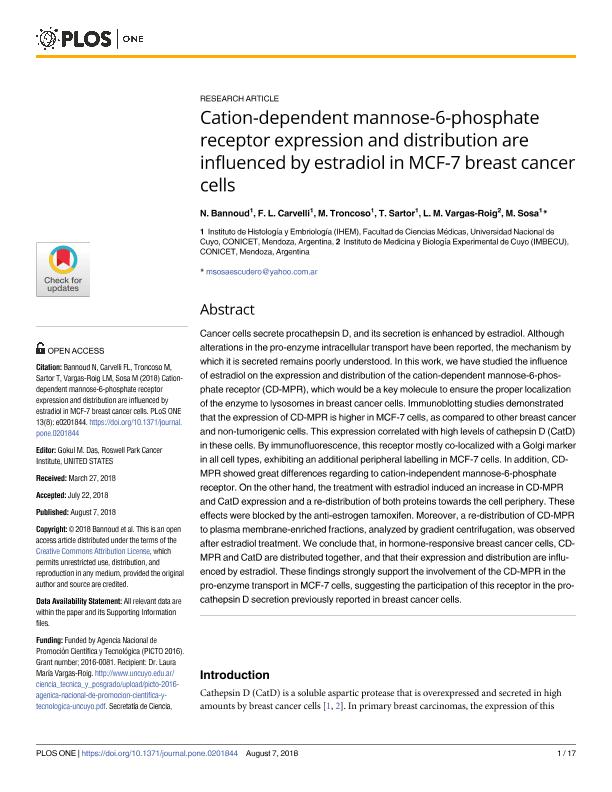Mostrar el registro sencillo del ítem
dc.contributor.author
Bannoud, Nadia

dc.contributor.author
Carvelli, Flavia Lorena

dc.contributor.author
Troncoso, Mariana Elizabeth

dc.contributor.author
Sartor, Tirso

dc.contributor.author
Vargas Roig, Laura Maria

dc.contributor.author
Sosa Escudero, Miguel Angel

dc.date.available
2019-11-29T21:01:57Z
dc.date.issued
2018-08
dc.identifier.citation
Bannoud, Nadia; Carvelli, Flavia Lorena; Troncoso, Mariana Elizabeth; Sartor, Tirso; Vargas Roig, Laura Maria; et al.; Cation-dependent mannose-6-phosphate receptor expression and distribution are influenced by estradiol in MCF-7 breast cancer cells; Public Library of Science; Plos One; 13; 8; 8-2018; 1-17; e0201844
dc.identifier.issn
1932-6203
dc.identifier.uri
http://hdl.handle.net/11336/91036
dc.description.abstract
Cancer cells secrete procathepsin D, and its secretion is enhanced by estradiol. Although alterations in the pro-enzyme intracellular transport have been reported, the mechanism by which it is secreted remains poorly understood. In this work, we have studied the influence of estradiol on the expression and distribution of the cation-dependent mannose-6-phosphate receptor (CD-MPR), which would be a key molecule to ensure the proper localization of the enzyme to lysosomes in breast cancer cells. Immunoblotting studies demonstrated that the expression of CD-MPR is higher in MCF-7 cells, as compared to other breast cancer and non-tumorigenic cells. This expression correlated with high levels of cathepsin D (CatD) in these cells. By immunofluorescence, this receptor mostly co-localized with a Golgi marker in all cell types, exhibiting an additional peripheral labelling in MCF-7 cells. In addition, CD-MPR showed great differences regarding to cation-independent mannose-6-phosphate receptor. On the other hand, the treatment with estradiol induced an increase in CD-MPR and CatD expression and a re-distribution of both proteins towards the cell periphery. These effects were blocked by the anti-estrogen tamoxifen. Moreover, a re-distribution of CD-MPR to plasma membrane-enriched fractions, analyzed by gradient centrifugation, was observed after estradiol treatment. We conclude that, in hormone-responsive breast cancer cells, CD-MPR and CatD are distributed together, and that their expression and distribution are influenced by estradiol. These findings strongly support the involvement of the CD-MPR in the pro-enzyme transport in MCF-7 cells, suggesting the participation of this receptor in the procathepsin D secretion previously reported in breast cancer cells.
dc.format
application/pdf
dc.language.iso
eng
dc.publisher
Public Library of Science

dc.rights
info:eu-repo/semantics/openAccess
dc.rights.uri
https://creativecommons.org/licenses/by-nc-sa/2.5/ar/
dc.subject
MANNOSE-6-PHOSPHATE RECEPTOR
dc.subject
ESTRADIOL
dc.subject
BREAST CANCER
dc.subject.classification
Bioquímica y Biología Molecular

dc.subject.classification
Ciencias Biológicas

dc.subject.classification
CIENCIAS NATURALES Y EXACTAS

dc.title
Cation-dependent mannose-6-phosphate receptor expression and distribution are influenced by estradiol in MCF-7 breast cancer cells
dc.type
info:eu-repo/semantics/article
dc.type
info:ar-repo/semantics/artículo
dc.type
info:eu-repo/semantics/publishedVersion
dc.date.updated
2019-10-21T20:11:10Z
dc.journal.volume
13
dc.journal.number
8
dc.journal.pagination
1-17; e0201844
dc.journal.pais
Estados Unidos

dc.journal.ciudad
San Francisco
dc.description.fil
Fil: Bannoud, Nadia. Consejo Nacional de Investigaciones Científicas y Técnicas. Centro Científico Tecnológico Conicet - Mendoza. Instituto de Histología y Embriología de Mendoza Dr. Mario H. Burgos. Universidad Nacional de Cuyo. Facultad de Ciencias Médicas. Instituto de Histología y Embriología de Mendoza Dr. Mario H. Burgos; Argentina
dc.description.fil
Fil: Carvelli, Flavia Lorena. Consejo Nacional de Investigaciones Científicas y Técnicas. Centro Científico Tecnológico Conicet - Mendoza. Instituto de Histología y Embriología de Mendoza Dr. Mario H. Burgos. Universidad Nacional de Cuyo. Facultad de Ciencias Médicas. Instituto de Histología y Embriología de Mendoza Dr. Mario H. Burgos; Argentina
dc.description.fil
Fil: Troncoso, Mariana Elizabeth. Consejo Nacional de Investigaciones Científicas y Técnicas. Centro Científico Tecnológico Conicet - Mendoza. Instituto de Histología y Embriología de Mendoza Dr. Mario H. Burgos. Universidad Nacional de Cuyo. Facultad de Ciencias Médicas. Instituto de Histología y Embriología de Mendoza Dr. Mario H. Burgos; Argentina
dc.description.fil
Fil: Sartor, Tirso. Consejo Nacional de Investigaciones Científicas y Técnicas. Centro Científico Tecnológico Conicet - Mendoza. Instituto de Histología y Embriología de Mendoza Dr. Mario H. Burgos. Universidad Nacional de Cuyo. Facultad de Ciencias Médicas. Instituto de Histología y Embriología de Mendoza Dr. Mario H. Burgos; Argentina
dc.description.fil
Fil: Vargas Roig, Laura Maria. Consejo Nacional de Investigaciones Científicas y Técnicas. Centro Científico Tecnológico Conicet - Mendoza. Instituto de Medicina y Biología Experimental de Cuyo; Argentina
dc.description.fil
Fil: Sosa Escudero, Miguel Angel. Consejo Nacional de Investigaciones Científicas y Técnicas. Centro Científico Tecnológico Conicet - Mendoza. Instituto de Histología y Embriología de Mendoza Dr. Mario H. Burgos. Universidad Nacional de Cuyo. Facultad de Ciencias Médicas. Instituto de Histología y Embriología de Mendoza Dr. Mario H. Burgos; Argentina
dc.journal.title
Plos One

dc.relation.alternativeid
info:eu-repo/semantics/altIdentifier/url/https://journals.plos.org/plosone/article?id=10.1371/journal.pone.0201844
dc.relation.alternativeid
info:eu-repo/semantics/altIdentifier/doi/http://dx.doi.org/10.1371/journal.pone.0201844
Archivos asociados
